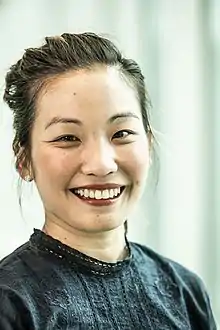Erinna Lee | |
|---|---|
 | |
| Alma mater | University of Melbourne |
| Occupation |
|
| Awards | Tall poppy award (2010) |
| Website | https://scholars.latrobe.edu.au/eflee |
| Academic career | |
| Fields | Autophagy, Bcl-2 |
| Institutions |
|
Erinna Lee is a Singaporean molecular biologist specializing in apoptosis and autophagy.[1][2]
Early life and education
Erinna Lee was born in Singapore and moved to Australia after high school. She was educated at University of Melbourne, studying a BSc(hons) in Biochemistry and Molecular Biology from 2000-2004. She studied her PhD at the Walter and Eliza Hall Institute of Medical Research,[1] which was awarded in 2007 by the University of Melbourne.[3][4] It was during this PhD where she began research on programmed cell death, which would form a large part of her subsequent research career.[1]
Career and impact
After completing her PhD, Lee worked as a postdoctoral fellow at the WEHI until 2015. She then moving to work at La Trobe Institute for Molecular Science,[4] becoming a laboratory head there in 2016 as well as being made a visiting scientist at the Olivia Newton-John Cancer Research Institute.[5]
Research
Lee's research focuses on cell death and survival, and in particular the role of the BCL-2 protein and its associated homolog family. This is typically via characterising protein-protein interactions in the BCL-2 signalling pathway via structural characterisation of the constituent proteins (both X-ray and NMR methods) as well as biochemical and biophysical characterisation of their interactions.[6] She then applies this information to animal models to understand the contributions of these proteins to normal physiology and disease.[5] Lee’s research has subsequently extended into autophagy more broadly and its contributions to human biology.[4]
Awards and honours
Erinna Lee was awarded a Tall poppy award in 2010,[7][8] and the 2021 Shimadzu Research Medal by the Australian Society for Biochemistry and Molecular Biology.[1]
References
- 1 2 3 4 "Erinna Lee". ASBMB. Retrieved 2 July 2021.
- ↑ "Parasite investigations breed 3 Tall Poppies". EurekAlert!. Retrieved 2 July 2021.
- ↑ "2007 ASBMB Award: Erinna Lee". www.asbmb.org.au. Retrieved 4 July 2021.
- 1 2 3 "Erinna Lee". scholars.latrobe.edu.au. Retrieved 2 July 2021.
- 1 2 "Dr Erinna Lee". www.onjcancercentre.org. Retrieved 2 July 2021.
- ↑ "Erinna Lee". LinkedIn. Retrieved 2 July 2021.
- ↑ "Dr Erinna Lee". AIPS. Retrieved 2 July 2021.
- ↑ "Parasite investigations breed 3 Tall Poppies". EurekAlert!. Retrieved 2 July 2021.